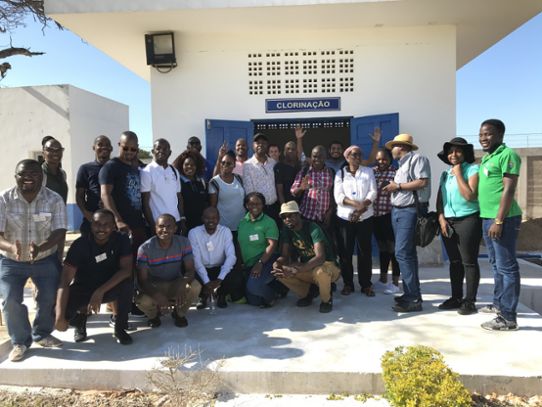The training programme has run over a year and included the latest climate research, how societies can adapt and crises be prevented. Special emphasis was given to issues related to water resources and agriculture.
The training consisted of a regional start-up seminar in Mozambique, a three-week theoretical course at SMHI in Norrköping, and design an implementation of the participants’ own specific climate projects in their home countries. This year a digital closing seminar in each participating country where the participants presented their projects, concluded the training programme.
The participants from Zambia, Mozambique, Botswana and Zimbabwe represent a wide range of organizations, including water, agriculture, disaster risk management and environmental management authorities, business and non-profit organizations.

Long-term impact of the programme
To ensure maximum long-term impact of the training programme it is important that participants’ projects are well anchored in the country. This is achieved through focusing on projects designed to contribute to national and international climate change commitments, but also through encouraging networking and communication between organizations. SMHI’s regional facilitators from the participating countries play a vital part in facilitating this.
“While this particular training programme has now formally come to an end, it does not mark the end of the work. It merely means that the project results, knowledge and new ideas are handed over to the participants´ own organizations to utilize and build on” says Tharcisse Ndayizigiye, project manager, SMHI.
“We have had very good cooperation with all participants and facilitators, and already have identified many interesting climate change adaptation solutions that can work well”. SMHI will continue to follow up on the projects and plans to compile a selection of case studies based on innovative projects by the end of the overall International Training Programme.
Solutions for climate related problems
The evaluations from the participants confirm increased knowledge about climate issues, a deeper understanding of different ways to tackle the climate change related problems and how to continue to contribute to national climate change mitigation and adaptation.

“I have learnt about the impacts of climate variability and change, and how mitigation and adaptation help to reduce the impacts. This is a help for refocusing our institutional efforts in addressing the challenges”, says Musonda Ngónga, Zambia Institute Environmental Management.
“We have shared experiences and opportunities from countries in the southern part of Africa with similar conditions. The bond of the participants and facilitators is likely to last long”.
HonestlyThabani Ndlovul, Southern Alliance for Indigenous Resources, Zimbabwe, emphasizes the increased insight into the complexity of the climate issues:

“Many times, people just compartmentalize it and make it look like it´s just an agriculture or water issue. I think this is vital because it makes us better understand the impacts and thereby devising better adaptation and mitigation methods.”
“My project was an eye opener for me particularly on the complexity of climate change impacts at community level especially on gender.”
The participants’ projects covered many different themes, for example climate smart agriculture, sustainable water management, womens participation in sustainable agriculture, how traditional and modern knowledge in weather and climate can be combined.
Local support from facilitators
SMHIs regional facilitators have played an important part in the training by providing the participants with local support in their projects. Kgomotsego Motlopi, facilitator, Botswana Institute for Technology Research and Innovation, is herself a former ITP participant and has helped to facilitate several training programmes:

“In general, the International Training Programme promotes awareness around climate change, what it is, what it is not, how it comes about, its impacts and the fact that there is something that can be done to reduce its negative impacts on people’s lives. The programme creates a mindset of alertness and mindfulness to observed changes around us.”
“Providing resources on programmes or projects that seek to promote change is important. The programme has played an important role in individual capacities and attitudes for climate change mitigation and adaptation. This positive impact on capacities and attitudes are fundamental to transformative thinking, which is key to future country-specific climate change mitigation and adaptation programme or project development.”
This training programme forms part of a larger climate change capacity building initiative implemented by SMHI on behalf of Sida. Further training programmes for African countries are planned during 2021-23.